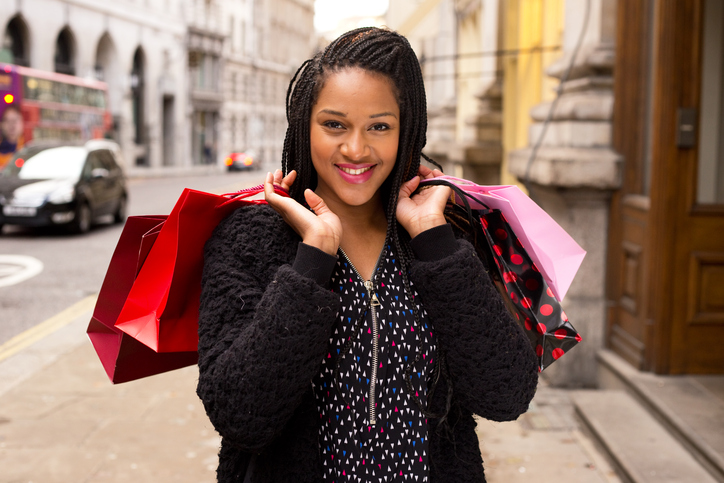 Some onlookers dismiss “buy Black” advocacy as something either “radical” or “cute to do” but it’s much bigger than that. The poverty, crime and poor education in the Black community can be improved by the support of current and creation of more community-owned, businesses. That’s a fact. Elections come every two to four years, but everyday we vote with dollars.
Some onlookers dismiss “buy Black” advocacy as something either “radical” or “cute to do” but it’s much bigger than that. The poverty, crime and poor education in the Black community can be improved by the support of current and creation of more community-owned, businesses. That’s a fact. Elections come every two to four years, but everyday we vote with dollars.
Just like hip hop artists rapping about shoes or alcohol with no endorsement deal, Black people give up their power and influence every time we spend money with people who have no vested interest in our community.
As a whole, Black people are ignorant to the principles of economic development. Poor Blacks spend money with Arabs and Asians via corner stores, nail shops and beauty supply stores, while middle class Blacks spend their money on expensive cars, alcohol and designer clothes by European designers. Regardless to education, we give our money away, thus failing to control our own community and making our communities ripe for crime and violence and both political and police corruption.
While each Black business owner can express their particular reason for being in business, the big picture goal of “buy Black” campaigns is to build a healthy flow of currency and resources wherein the community buys from Black businesses who then reinvest in the community via job creation and donations to community organizations and faith-based institutions.
Check out these nine reasons to buy Black, adapted with permission from the American Independent Business Alliance.
Create Real Democracy: Politics without economics is symbol without substance. Black business ownership means residents with roots in the community are involved in key development decisions that shape Black people’s lives and local environment.
Create Jobs and Opportunities: Not only do independent businesses employ more people directly per dollar of revenue, they also are the customers of local printers, accountants, restaurants, wholesalers, farms, attorneys, media outlets, and etc which help in the expansion of opportunities for local entrepreneurs. Research concludes that if we increased revenue generated in Black businesses to just two percent, we could create a million jobs.
Build community: The casual encounters enjoy at neighborhood, Black businesses and the public spaces around them build relationships and community cohesiveness. They’re the ultimate social networking sites.
Strengthen Your Local Economy: Each dollar you spend at independent businesses returns 3 times more money to your local economy than one spent at a chain (hundreds of times more than buying from an online mega-retailer) — a benefit we all can bank on.
Shape our Character: Independent businesses help give your community its distinct personality.
Lower Taxes: More efficient land use and more central locations mean local businesses put less demand on our roads, sewers, and safety services. They also generate more tax revenue per sales dollar. The bottom line: a greater percentage of local independent businesses keeps your taxes lower.
Choices: A wide variety of independent businesses, each serving their customers’ tastes, creates greater overall choice for all of us.
Give Black to Your Community: Small businesses donate more than twice as much per sales dollar to local non-profits, events, and teams compared to big businesses.
Increase community wealth (everybody eats): The multiplier effect created by spending locally generates lasting impact on the prosperity of local organizations and residents.
There are several Buy Black campaigns that can be found online. Bean Soup Times is working directly with the BuyBlackMovement.com. Go there to shop, browse or to simply set up a free account to stay plugged into the movement.
Do you have a reason not listed for buying Black? Post it on the comments and please share this post with others via Facebook and/or Twitter.
Article republished with permission from Bean Soup Times.
 Toure Muhammad is the head bean, publisher and chief strategist of Bean Soup Times. The Morehouse graduate has written front page cover stories for The Final Call and N’digo. He has been featured in the Chicago Reader, Upscale magazine, rolling out newspaper, and N’Digo magapaper. He’s been featured on Tavis Smiley’s radio show on NPR, on Chicago’s WBEZ (Chicago public radio), and many other radio shows.
Toure Muhammad is the head bean, publisher and chief strategist of Bean Soup Times. The Morehouse graduate has written front page cover stories for The Final Call and N’digo. He has been featured in the Chicago Reader, Upscale magazine, rolling out newspaper, and N’Digo magapaper. He’s been featured on Tavis Smiley’s radio show on NPR, on Chicago’s WBEZ (Chicago public radio), and many other radio shows.








